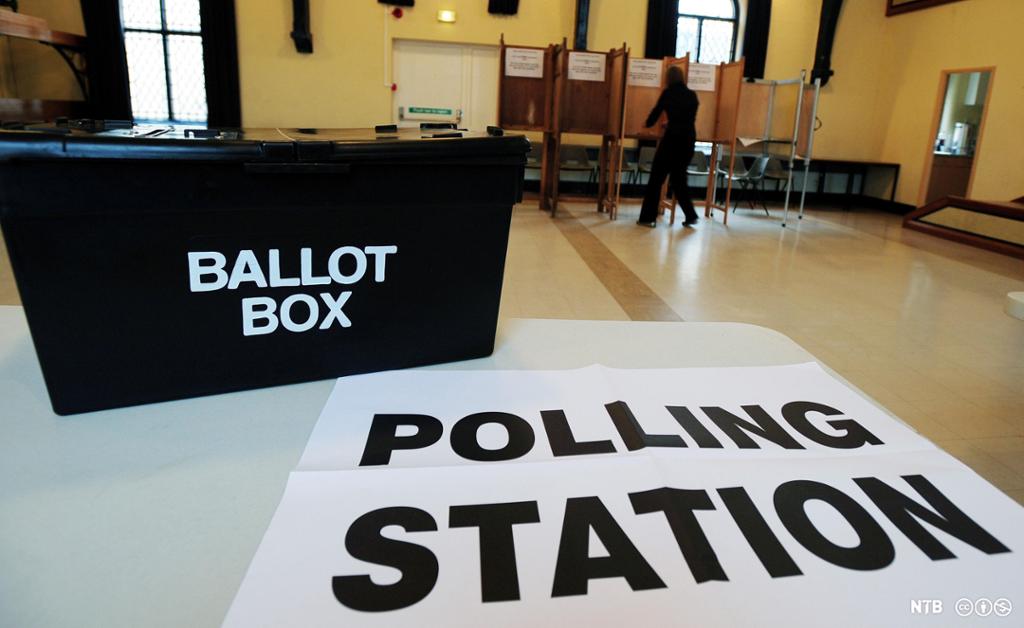The General Election in the UK

Here you will get a quick overview of the General Election.
The UK is divided into 650 constituencies. Each constituency is represented by a member of Parliament (MP). Those who run for election spend a lot of time meeting people, often going door to door to talk to people. The idea is that people should feel that they are electing someone who will speak for them, someone who will represent them in Parliament. How many voters there are in each constituency varies, but there are usually between 55 000 and 80 000.
To vote in the general election a person must:
be registered to vote
be 18 or older on the day of the election (‘polling day’)
be a British, Irish, or qualifying Commonwealth citizen
be resident at an address in the UK (or a British citizen living abroad who has been registered to vote in the UK in the last 15 years)
not be legally excluded from voting
Before the election, each party makes a party manifesto where they explain what they want to accomplish if they win the election. These manifestos are also called 'party platforms' or 'party programmes'.
In the UK, there is a first-past-the-post system where the winner takes all. The person who gets the most votes in a constituency wins a seat in parliament. For example, there can be a situation where candidates from five parties are running: Candidate 1 gets 20% of the votes, candidate 2 gets 18%, candidate 3 gets 17%, candidate 4 gets 16%, and candidate 5 gets 29%. 71% of the people in the constituency voted for someone else, but candidate 5 still wins the seat.
The party that wins the most seats in Parliament gets to form the government. The leader of the party becomes prime minister.
Since there is no proportional representation in the system, it has been difficult for smaller parties to win enough seats in Parliament to get in a position of power. After World War II, either the Conservative Party or the Labour Party have formed governments, with the exception of the 2010 election, which resulted in a hung parliament. The Conservative Party then formed a coalition government with the Liberal Democrats to take over power from Labour.
Until 2011, the sovereign could dissolve parliament at any time during a five-year period, at the request of the prime minister. This ensured that a prime minister could call an election at a time that seemed advantageous to the party. The Fixed-term Parliaments Act of 2011 means that Parliament is dissolved automatically after five years, twenty-five working days before a general election. Under the terms of the Fixed-term Parliaments Act, the next general election can be expected to take place on Thursday 2 May 2024.
Since the introduction of the Fixed-term Parliaments Act, earlier elections have been called twice: in 2017 and in 2019. There are two provisions that allow for earlier elections to be called:
If parliament passes a motion of no confidence against the government and does not pass a motion of confidence in a new government within 14 days.
If a two-thirds majority of the House of Commons agree that a general election should be called.
If a seat in the House of Commons becomes vacant between general elections, a by-election is held. This can for example happen if an MP dies, is unable to carry out their duties due to mental illness, or if they are convicted of a crime that carries a sentence of more than twelve months.
The option of a recall election was introduced in 2015. It provides the opportunity for a constituency to recall their MP if they have behaved in ways unbecoming to their role, for example if they have been convicted of a crime or have been suspended from parliament for a longer period. In such cases, the electorate may sign a petition demanding a by-election. For a recall petition to be successful, it must be signed by at least 10% of eligible registered voters.
Check what you remember from the text by taking the quiz.
Relatert innhold
Interactive tasks about the system of government in the UK.
Tasks about the system of government in the UK.